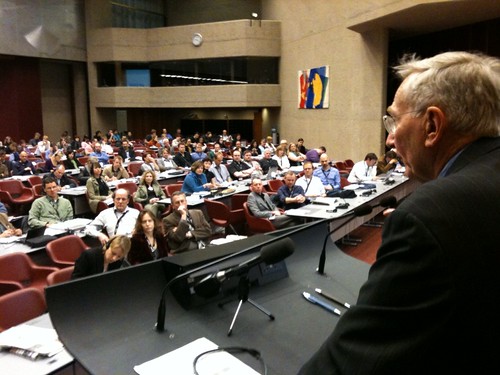Use of data-possibilities in investigative journalism explodes in these years. That was one of my statements at the 7th Global Conference for Investigative Journalism and Computer-Assisted Reporting. With more than 500 participants from over 80 countries the conference in Geneva from 22th to 25th of April 2010 was a big revitalization of the network.
The threat from the Icelandic volcanic ash couldn’t stop people to find new ways to get to the conference from all over the world. Only few didn’t make it.

Keynote Seymour Hersh talking to the audience
On Friday the 22th of April I moderated the meeting of the Global Investigative Journalism Network. The conclusions were very promising with a lot of organizations participating the meeting. The network will continue the loose structure, having the meetings at the conferences as the highest authority. The network will accept new members when they are non-profit, non-partisan, has journalism as the main area and supporting the idea of investigative and computer-assisted reporting as a goal.
When my good friend Brant Houston and I back in 2003 in Copenhagen took the initiative to form the network we had the same statement for becoming member of the network. At that time I was in the steering committee in the network representing Danish Internationally Center for Analytical Reporting, Dicar. Dicar closed in 2006, and today I represent the Danish School of Media and Journalism in the network.
During the meeting we decided to have a volunteer group to do the practical work. I joined this group. We also heard the plans for the next conference in Kiev in Ukraine in September 2011, and there were some first ideas for places for the conference in 2013.
Look here for the website of the network and for the Geneva-conference. I took pictures during the conference. Look here for all of them (free to use).
CAR-training
On the special track on computer-assisted reporting the two main trainers, David Donald from US and Helena Bengtsson from Sweden, couldn’t come.
I then accepted to jump in Thursday morning to do the overall introduction on the status of CAR and restructure the many sessions missing trainers, relaying on other trainers. Sebastian Mondial from Germany, Luuk Sengers from Netherland, Mark Horvit and Brant Houston from US helped me by jumping in taking extra sessions on international data, beyond Google, and the use of spreadsheets and database managers in journalism.
Everybody were very enthusiastic, the audience very patient and I think all in the end went from these sessions with a lot of inspiration and useful information.
It also turned out to be really overcrowded in the training room for several of the sessions – totally changing the situation with minor interests some years ago.
After the presentations I found time to write handouts on the main content of my presentations:
Overview of CAR
International data
Beyond Google
Hands-on training in Excel and Access
An interview on the status of CAR
Moderation of two panels
Part of my job on the conference was also to moderate the presentations of Morten Frich, Berlingske Tidende in Denmark on the crowdsourcing project “the crime” and Blaz Zgaga, freelance from Slovenia, on the case of Patria – the paying of bribe from a Finnish state owned company selling arms to Slovenia. The bribes went to the former prime minister of Slovenia. Both were very impressing projects.
And then I enjoyed the chat with some many old and new friends. It is the spirit of good journalism meeting at these conferences.



[…] This post was mentioned on Twitter by katbaldwyn, Kaas & Mulvad. Kaas & Mulvad said: Data-use explode in journalism: Use of data-possibilities in investigative journalism explodes in these years. Tha… http://bit.ly/9KlFwH […]
[…] Data-use explode: https://www.kaasogmulvad.dk/english/data-explode-journalism/ […]